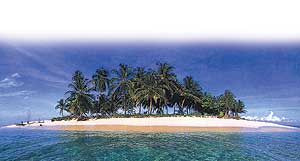 PATTAYA - If ever there was a city primarily dedicated to pleasure, then this is it. Two hours on an elevated highway from Bangkok, on weekends the motorway is clogged with air-conditioned coaches and fancy cars conveying those who yearn to relax down to the beaches and bars of Pattaya.
PATTAYA - If ever there was a city primarily dedicated to pleasure, then this is it. Two hours on an elevated highway from Bangkok, on weekends the motorway is clogged with air-conditioned coaches and fancy cars conveying those who yearn to relax down to the beaches and bars of Pattaya. The delights of Pattaya were first sampled by outsiders 40 years ago when Unocal workers arrived here to prospect for natural gas in the Gulf of Thailand. Then came the Vietnam War and Pattaya became the fleshpot nearest to the US airbase at Uta Pao. Pattaya was soon on its way to being transformed from a coconut-fringed fishing village to the world's R&R destination.

Pattaya has lost much of its lustre to the more up-market (and less seedy) tourist watering holes such as Phuket and Koh Samui. But the nearness to Bangkok still brings hordes of tourists, other south-east Asians and even the development set. Yes, there is even something called the "Consultants Caf?" where the waiters seem to know that the experts of the consultancy business are experts at spending other people's money. There is a care-a-hang attitude here among the residents and the visitors, a true Gommorah of the East.
That the Thai tourism industry continues to flourish despite places like Pattaya digging themselves into a rut is a tribute to this country's resilience and diversity. Prosperous Thais are a little shy to admit it openly, but they concede in private that sex tourism gave a big push to their economy in the earlier phase of their development.
It had its by-products, they admit, the AIDS epidemic, resorts that rotted away and the embarrassing way in which "one night in Bangkok" came to mean more than just a Royal Orchid transit stopover.
There has also been an impact on culture, and Thai social scientists often bemoan the erosion of traditional propriety and courtesy and the way in which these traditions have been reduced to a caricature. The cultural shows are a parody, and the handicrafts have become airport art.
Countries strive for economic growth, but when this growth is too rapid, it exacts a price. Thailand is an example. Every society has to decide for itself how much it is ready to sacrifice in order to chase prosperity.
King Jigme Singye Wangchuk of Bhutan has propounded his theory of Gross National Happiness. Interestingly his philosophy is shared by Thailand's much-revered monarch, King Bhumibol Adulyadej, who has proposed his concept of "Sufficiency Economics". Popular as he may be, it doesn't look like too many Thais are listening to the wise words of their king on how to live frugally, self-sufficiently and to have a small ecological footprint.
As the world gets ready to review the progress since the last Earth Summit ten years ago at another mega-gathering of leaders in Johannesburg this month, it is a good to time to look at the linkages between economics and ecology. Investors tend to think that money can do everything, and that the earnings from increased productivity will be enough to pay for even the most expensive remedial measures in future. But it seldom happens that way.
Groundwater depletion due to pumping has lowered the water table and caused the city of Bangkok to sink by almost five cm per year, in some places even 12 cm. The Thai government has an ambitious plan to recharge the groundwater, but the engineers admit that the subsidence may be irreversible. The drought on Koh Samui island is big news these days. Virach Phongchababnapa, a tourism entrepreneur, told The Nation newspaper: "We in the tourism business sell our natural resources like prostitutes sell their bodies. So many of us only think about making quick profits, forgetting that we have to protect the resources that nature has bestowed us. We must save it in order that they may be enjoyed in the future."
If the Thais are not listening to their king, it is not likely they will listen to Khun Virach. Thailand's economy is now on a full rebound after the Asian crisis, and now more than ever there are even fewer takers for King Bhumibol's "Sufficiency Economics". Boomtime Thailand's prime minister is business tycoon Thaksin Shinawatra. And like most tycoons he is a born-again, supply-side believer in the theory of perpetual growth.
Thailand shows how things can go wrong when on the surface it looks like everything is going right. Ignoring delicate eco-systems and fragile cultures is not just immoral, it is also bad economics. And if you leave it only to businessmen, a country only realises what it has destroyed once it's all gone.
For Nepal, there are so many lessons in Thailand. Bad examples of ignoring carrying capacity, of killing the goose that lays the golden eggs. Also good examples of towns and islands that have realised their mistake and are now feverishly trying to turn the clock back before it is too late. The moral of the story is: treating tourism as an important industry is fine, but we must remember that most "tourism assets" are non-renewable.



